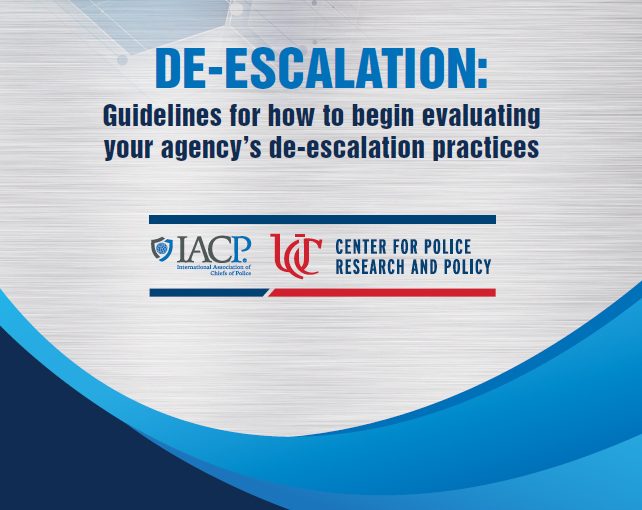Police officers fulfill an imperative role as guardians of all community members. Inherent to this role is the ever-evolving effort of the profession to balance officer safety and wellness with the responsibility to act in the public interest while also cultivating community partnerships and trust.
Incorporating mechanisms of evaluation and evidence-based practices in policing—especially in areas like de-escalation and use of force—can help achieve these goals.
The IACP/University of Cincinnati Center for Police Research and Policy (the IACP/UC Research Center), dedicated to continually improving the profession through evidence-based practices, recently published the De-escalation Reference to engage police leaders in this topic. The IACP/UC Research Center’s De-escalation Reference, a collection of one main document and seven supporting documents, focuses on evaluating de-escalation training and policy, as well as considerations for data collection, reporting, and communication with the public.
The evaluation of de-escalation training, in particular, is central to the reference because of the lack of scientific research on policing training curricula. The De-escalation Reference empowers police leaders to evaluate de-escalation training and response to not only enhance current practices (and, ultimately, community safety), but to also work toward increasing community confidence in law enforcement.
In January 2020, the IACP brought together a focus group of police practitioners and subject matter experts to gather perspectives on de-escalation. From their discussions emerged two core values central to the policing profession: empathy and impartiality. The De-escalation Reference aims to infuse these core values into practices related to de-escalation and use of force.
Using the core values as a foundational base, the reference takes a three-pronged approach to evaluating current practices.
- Developing a knowledge base, including history and background, theoretical foundations in police decision-making, a review of research on factors associated with an officer’s decision to use force, and statistics on injuries that occur during use-of-force incidents
- Implementing mechanisms of learning such as training, policy, and evaluation
- Creating procedures for follow-up and accountability like data collection and reporting, officer wellness, and community communication
Supporting Documents
While the main document of the De-escalation Reference provides an overview of use of force and de-escalation, the supporting documents help the reader apply that content to practice. Three of the seven documents summarize original research conducted by the IACP/UC Research Center.
- The “Use of Force Narrative Analysis” that examined narrative accounts of police officers involved in use-of-force incidents from 2016 to 2018 in the Tulsa, Oklahoma, Police Department (TPD) and the Cincinnati, Ohio, Police Department (CPD);
- The “Use of Force Data Analysis,” which functions similarly to the narrative analysis but used quantitative data from the TPD; and
- The “De-escalation Training Evaluation,” conducted at the University of Cincinnati Police Department, which provides the field with an example of a de-escalation training evaluation in the policing profession.1
Together, these research summary documents help highlight the importance and impact that evidence-based analysis can have on use of force and de-escalation practices in police operations.
Two worksheets for police leaders add an interactive component to the reference. The worksheets provide prompts for police leaders to brainstorm considerations specific to their own departments. They include
- “Evaluating Your Agency”—a worksheet for evaluating de-escalation training, and
- “Sharing Your Agency’s De-escalation Strategies with the Public”—a worksheet that assists police leaders in communicating sensitive issues to their communities.
While the reference urges police leaders to consider partnering with academic institutions to aid in the process of scientifically evaluating training, the last two supporting documents provide foundational knowledge on scientific research methods and approaches:
- “Example Outcomes of Interest,” which suggests outcome variables the police might consider measuring in order to determine the success of training, and
- “Designing the Evaluation,” which serves as an introduction to research methods.
All seven of these supporting documents serve as tools for police leaders in evaluating current practices. However, many of them are also adaptable to accommodate police leaders who wish to evaluate and communicate practices in other areas of police operations beyond de-escalation and use of force.

Key Takeaways
The De-escalation Reference has many important takeaways for police leaders:
- the importance of infusing core values throughout all aspects of police operations
- the place of evaluation in informing positive or negative impacts of certain methods
- the understanding that de-escalation is a skill intended to reduce injury and increase safety that law enforcement can add to their response options when faced with resistance
- the importance of accountability through transparency in communications and data collection and reporting
- the influential position that police leadership holds in promoting evidence-based evaluation
The De-escalation Reference is a summary of valuable resources with positive implications for knowledge, policy, and practices in community-police engagements, ultimately supporting law enforcement in their role as guardians of our communities.
Note:
1 Michael J. Smith et al., Multi-method Investigation of Officer Decision-Making and Force Used or Avoided in Arrest Situations: Tulsa, Oklahoma and Cincinnati, Ohio Police Use of Force Narrative Data Analysis Report (San Antonio, TX: University of Texas at San Antonio, 2020); Michael J. Smith et al., A Multi-method Investigation of Officer Decision-Making and Force Used or Avoided in Arrest Situations: Tulsa, Oklahoma Police Department Administrative Data Analysis Report (San Antonio, TX: University of Texas at San Antonio, 2019); Gabrielle T. Isaza et al., Evaluation of Police Use of Force De-escalation Training: Assessing the Impact of the Integrating Communications, Assessment, and Tactics (ICAT) Training Program for the University of Cincinnati, OH Police Division (UCPD) (Cincinatti, OH: IACP/UC Center for Police Research and Policy, 2019).
Please cite as
Rebecca Boudreaux, “The IACP’s De-escalation Reference,” IACP@Work, Police Chief 87, no. 11 (November 2020): 66–67.



